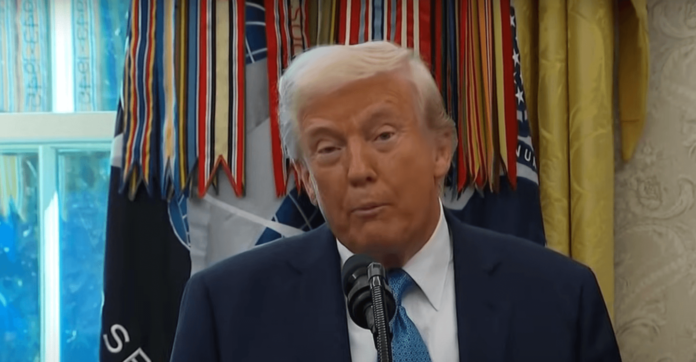President Donald Trump recently made headlines with two big updates about the economy. First, he said he might reduce tariffs on Chinese products, which could bring relief to businesses and investors. Second, despite harsh criticism of Federal Reserve Chair Jerome Powell, Trump said he has no plans to fire him. These comments sent mixed signals to the market, causing economists and business owners to speak out. To watch the full interview and statements, you can check it out here.
Tariffs on China: A Possible Change
Trump told reporters that the 25% tariffs on Chinese goods might come down. This was unexpected since Trump has long taken a hard stance on trade with China. Tariffs are taxes on imports, and they can make products more expensive for U.S. companies and consumers. By suggesting a reduction, Trump gave a sign that the trade war might be easing, which helped calm the markets.
When the tariffs first started, they were meant to protect American businesses. But many experts say they have done more harm than good. Economists believe that lowering these tariffs could help businesses, especially small ones that rely on Chinese products.
What Trump Said About the Fed Chair
Even though Trump recently called Jerome Powell a “major loser,” he now says he won’t fire him. Instead, he wants the Federal Reserve to lower interest rates. Trump thinks cutting rates would help boost the economy. Lower rates mean people and businesses can borrow money more cheaply.
Trump’s change in tone surprised many, especially since he has been attacking the Federal Reserve for months. He believes that Powell isn’t doing enough to help the economy grow. However, critics say that this kind of pressure from the president could hurt the independence of the Federal Reserve.
The Market Reacts to Trump’s Mixed Messages
Economist Larry Summers commented on Trump’s flip-flopping statements. He said the market performs poorly when Trump pushes hard on tariffs and criticizes institutions like the Fed. But when Trump backs off and softens his stance, the market recovers.
Summers explained that this kind of unpredictability is bad for investors. Markets prefer clear, stable policies. When Trump makes extreme statements and then reverses them, it creates confusion. Investors don’t know what to expect next, and that makes them nervous.
A Small Business Owner Speaks Out
Scott Anderson, a small business owner from New Hampshire, shared how tariffs have affected his company. He and his wife started their business 30 years ago, and they employ about 20 people. Most of their products are made in China.
Because of the tariffs, they now have a quarter million dollars’ worth of inventory stuck in China. They can’t afford to pay the high tariffs to bring the products into the U.S. As a result, they had to stop production, cancel orders, and lay off staff. They went from 12 employees at the start of the year to just 5 now.
Scott said they have lost over $1 million since the tariffs began six years ago. That’s all their profits, gone. He said they tried to prepare for this by looking into options like making products in the U.S., but it wasn’t possible. The costs were too high, and there was no government help available for businesses like his.
Trouble Competing on Amazon
Scott also talked about how hard it is to compete online, especially on platforms like Amazon. He explained that over 60% of products on Amazon come from third-party sellers, and many of them are based in China. These sellers often don’t pay the same high tariffs as American businesses do.
This creates an unfair playing field. U.S. companies can’t raise their prices to cover the tariff costs because their foreign competitors keep prices low. As a result, many small American businesses are losing money and customers.
What This Means for the Future
Trump’s comments about reducing tariffs and keeping Powell as Fed Chair might sound like good news, but the overall message remains unclear. On one hand, easing tariffs could help businesses and calm the markets. On the other hand, constant changes and mixed messages from the White House are making it hard for anyone to plan ahead.
Small business owners like Scott are asking for more support and clearer policies. They want the government to consider how its decisions affect real people—not just big companies or stock prices. Until then, they are stuck in a tough spot, trying to survive in an unpredictable economy.
Conclusion
Trump’s recent statements show that even small changes in tone or policy can have a big impact on the economy. Lower tariffs could be a lifeline for many businesses, but uncertainty remains a serious problem. Economists and business owners agree that stable and thoughtful leadership is key to helping the economy grow.
For now, small businesses are doing their best to adapt. But without clear support or fair rules, many are struggling. The hope is that the government will listen and make changes that help everyone, not just a few.
